College of Engineering Advancing the Future of Solar Energy
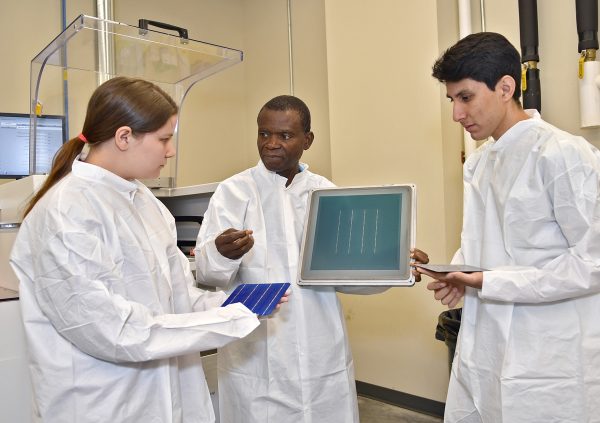
At The William States Lee College of Engineering, our students, faculty and alumni are engaged in a multitude of activities that are advancing solar energy. In classrooms, our students are studying the principles of photovoltaics and tackling hands-on learning projects that teach them to work with solar energy. In laboratories, our researchers are designing improved solar cells, developing technologies for delivering solar power to the grid, and advancing methods for storing and using solar power at maximum efficiency. In the commercial world, our entrepreneurs are creating jobs as they take solar energy to the next level.
As a state university, UNC Charlotte’s mission is to deliver higher education, improve the lives of citizens and support North Carolina industry. This mission makes the Lee College of Engineering’s solar power work extremely important, because North Carolina is the second largest solar power producing state in the country.
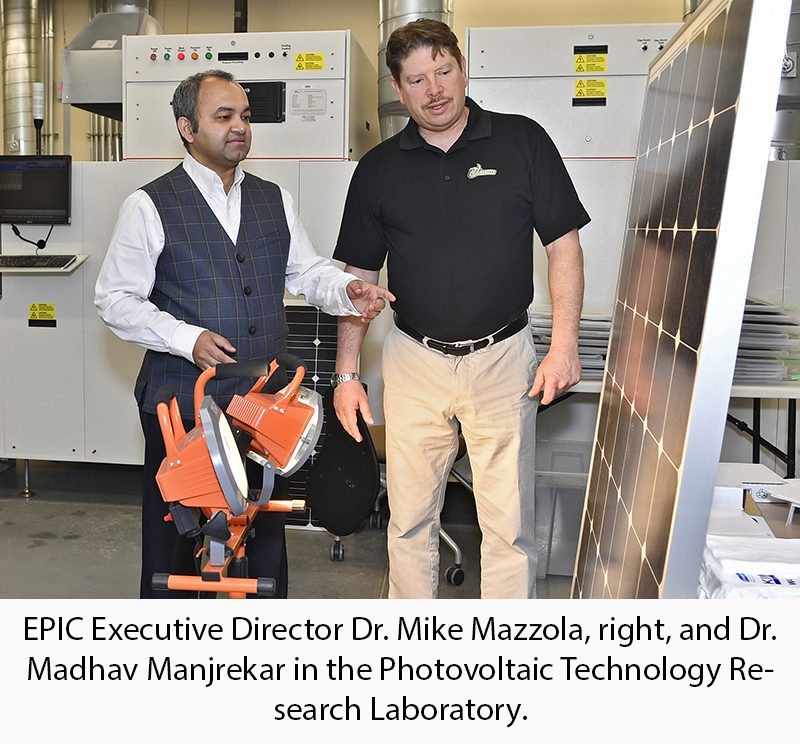
“In North Carolina we have the second most capacity to connect solar power to the grid of any state in the country, behind only California,” said Dr. Mike Mazzola, executive director of UNC Charlotte’s Energy Production and Infrastructure Center (EPIC). “And we are actually number one in utility-scale solar power, because a lot of California’s generation is from residential roof-top solar panels.”
Solar power production in North Carolina is expected to grow even faster in the next decade, thanks in part to NC House Bill 589. The measure, a collaboration between utility officials and solar interests, establishes a competitive bidding program and a solar power leasing program.
“By allowing third-party solar producers to sell power to the grid, residential solar production will definitely be growing in North Carolina in the next few years,” Dr. Mazzola said. “South Carolina and Georgia are also adding a lot of solar capacity, making this region an even greater solar producer.”
This growing solar industry will require a larger workforce to design, build, operate and maintain it, and solar engineers will be in greater demand. To prepare these future engineers, the Lee College of Engineering has numerous solar-related educational programs at the undergraduate and graduate levels.
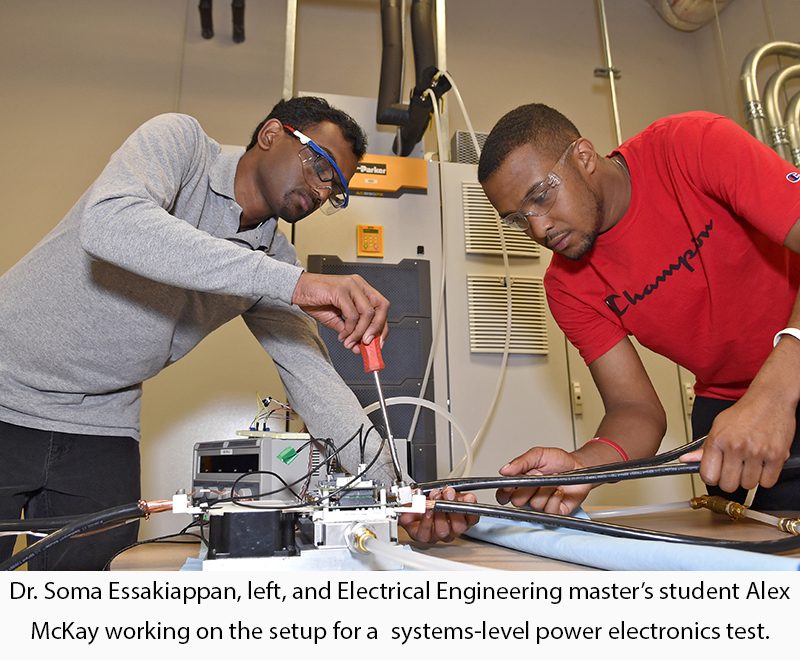
Solar Engineering Education
“The founding mission of EPIC is workforce development,” Dr. Mazzola said. “Through college of engineering programs, we give students a taste of renewable energy, including solar, as part of their education. These efforts help inspire students who are excited and motivated about the future of renewable energy.”
The college of engineering offers energy concentrations in all six of its undergraduate degree programs. The concentrations require students to take a group of technical electives focused on energy, which can include renewables, solar and grid integration of these technologies.
Solar energy studies may also be part of required core courses. One example is Electrical and Computer Engineering (ECE) students designing and fabricating solar cells in the Cameron Center clean room, as part of their lab work in Sophomore Design ECGR 2252.
In their year-long senior design projects, student teams have completed a number of solar-related projects in the past few years. Many of these projects are sponsored by solar power companies in the Carolinas. Examples of such senior design projects include:
- Design of a solar array micro-grid system for a 500kW solar facility in connection with SCE&G.
- Development of a simulation tool for Duke Energy to assess the benefits of battery energy storage on a power distribution system with large solar generation.
- Design of a rooftop photovoltaic array for a campus parking deck for UNC Charlotte Facilities.
- Development and field testing solar power companion inverters for Rivegy.
- A study to identify the potential uses of solar thermal energy at a regional utility plant on campus for UNC Charlotte Facilities.
- In a project for the Electrical Power Research Institute (EPRI) addressing the vegetation maintenance issues associated with large solar farms, students have developed autonomous lawn mowers that use solar recharging stations.
At the graduate level, Lee College of Engineering students also take renewable-energy-related courses, such as ECGR 4290 Science and Engineering of Photovoltaic. Many students also serve as research assistants, working with their faculty mentors on solar-related research.
“At all levels,” Dr. Mazzola said, “there is an educational environment and culture surrounding our students here that deals with the very-real issues involved in renewable energy, a major part of which is solar.”
Solar Engineering Research
In the area of research, the college of engineering impacts solar energy from the fundamentals of producing better materials for solar cells, to the incredibly complex issues of how to use and store photovoltaic generated power for the grid.
“With our state-of-the-art EPIC facilities, we are able to carry out solar research on a number of levels,” Dr. Mazzola said. “In our Photovoltaic Technology Research, Photovoltaic Integration, Renewable Power, Smart Grid, Flexible Energy and other laboratories, we have the capability to study, develop and test solar energy research. These capabilities are important to our researchers, and make us an attractive full-service applied research partner for working on grants with business and industry.”
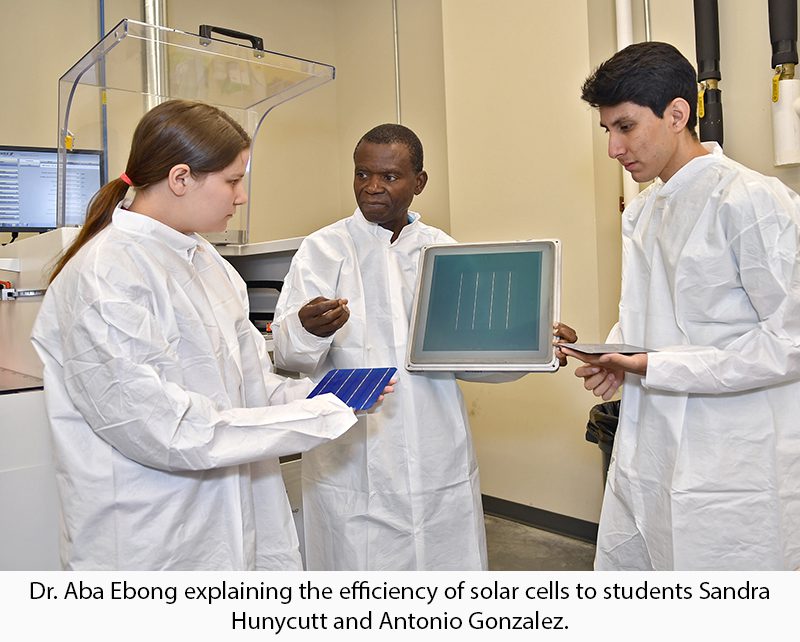
Some of the solar research now underway in EPIC laboratories includes:
- In the Photovoltaic Technology Research Laboratory, led by Dr. Aba Ebong, ECE, researchers are designing, manufacturing and testing new ways to make solar cells. The research is leading to improved efficiency in solar cells, while at the same time developing manufacturing techniques to make them more cheaply. Improvement methods include increasing the number of busbars to five from the standard three, using grid line segmentation to reduce metal shading to less than five percent, and using bifacial solar structures.
- Dr. Yong Zhang’s, ECE, research involves growing new semiconductor materials for power electronics, including solar power applications. Using molecular beam epitaxy methods, he and his students build materials a layer at a time, with each layer being as thin as one atom.
- The Photovoltaic Integration Lab is developing inverters for the crucial power interface between photovoltaic solar panels and the grid. Under the direction of Dr. Babak Parkhideh, ECE, the lab is using advanced power electronics to make inverters smaller and more flexible, with better efficiencies for PV integration
- Led by Dr. Madhav Manjrekar, the Renewable Power Laboratory consists of solar array simulators from Ametek, which can mimic power profiles generated either by a single solar panel or a large solar array. Capable of supplying from 35Vdc up to 1000Vdc, these simulators can be employed to test the latest panel-level micro-inverters or central solar inverters that support dc link voltages upwards of 800Vdc.
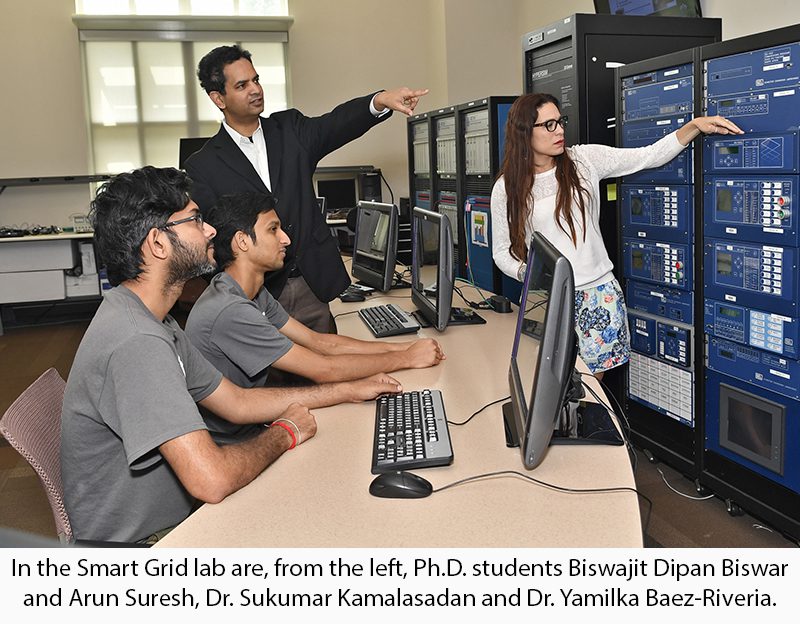
A solar power research area of growing importance is the prediction, storage and use of solar generated power. A number of UNC Charlotte faculty are working on this issue.
“The question is, when are people going to turn on the lights? When is the power going to be used? There has always been a degree of uncertainty knowing this,” Dr. Mazzola said. “With 10 percent of generation during the day now being solar, which has its own degrees of uncertainty, the questions of supply and demand become even more complex. And in the near future, when even more people have their own residential solar power to use and to sell to the grid, this will become even more complicated.”
Researchers working on these questions include:
- Dr. Tao Hong and his Systems Engineering students are experts in the area of energy forecasting and optimization. Their work applies various statistical and optimization techniques to the development of algorithms and tools for energy forecasting, power system planning, renewable integration, reliability planning and risk management.
- Working with a Duke Energy photovoltaic and battery storage system testbed, Dr. Sukumar Kamalasadan, ECE, and his students are compiling data and creating algorithms to increase the efficiency of how solar power is used on the grid. The work includes solutions for when to use the energy directly, when to store it in batteries, and when to use the battery power.
- Working to various degree in the areas of advanced renewable energy systems modeling and analytical systems, integration of renewable energy resources, renewable forecasting, grid market integration and building control systems, are Dr. Valentina Cecchi, ECE, Dr. Umit Cali, Engineering Technology and Construction Management (ETCM), Dr. Weimin Wan, ETCM, and Dr. Badrul Chowdhury, ECE and Systems Engineering.
Solar Engineering Entrepreneurship
Taking UNC Charlotte’s applied solar technology research to the next level, a number of startup companies have been formed to commercialize photovoltaic power solutions.
“We’ve become a leader in entrepreneurship,” Dr. Mazzola said. “Beyond working on the fundamental problems of the technology, our researchers are also heling to spin off a number of companies. This application of research directly impacts North Carolina’s future by creating jobs and strengthening our economy.”
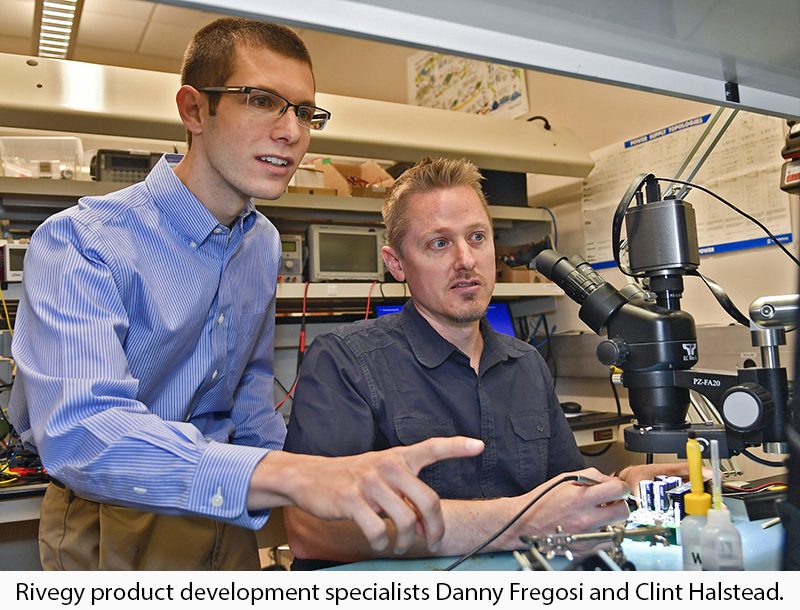
Rivegy is a National Science Foundation Small Business Innovation Research (SBIR) grant funded company that was spun off from UNC Charlotte research. Oak Ridge National Laboratory is also collaborating with the company on power electronics architecture. Rivegy is developing power electronics for use in solar and other distributed energy applications. Its proprietary Rivegy SDSI (Software-defined Synthetic Inverter) enables low-cost, long-life, high-efficiency, and flexibility to usher in the next generation of smart distributed energy systems.
Founded in 2011, the startup company Sinewatts works closely with researchers in the EPIC Photovoltaic Integration Lab. The company has won two rounds of funding from the Department of Energy’s SunShot Program. Its products are microchip inverters that convert the energy coming from solar panels from direct current (DC) to alternating current (AC).
Solar Engineering Future
For the future, advance solar technologies will continue to be developed and refined. As legislation makes solar a more viable technology for home owners, the complexity of managing solar power will become even greater.
“Solar power engineers will be needed in all these new areas to solve future problems,” Dr. Mazzola said. “We are educating and preparing these engineers. We are continuing to integrate more solar, and other renewable energy studies, into our curricula.”
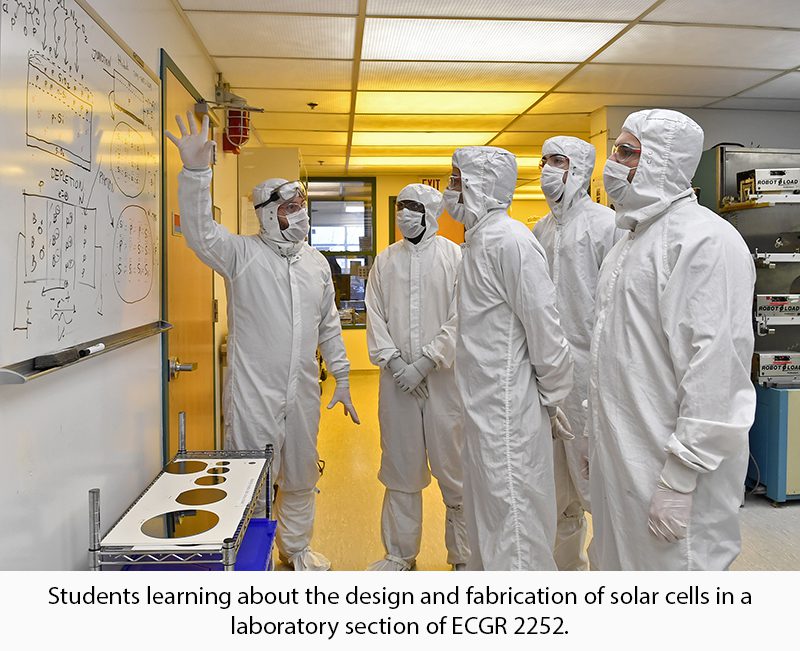
The social sciences, and even political science, will also play a bigger role in the future management of solar power, as consumer mindsets about energy use begin to change.
“Right now, the amount of power we generate follows the amount of energy load that is needed,” Dr. Mazzola said. “We’re starting to see indications that there could be a complete reversal of this in the future, which means load demand will follow generation capability instead of visa versa. It’s going to be an interesting time. The research in our laboratories and the technologies developed by our spinoff companies is going to be extremely important in the creation of and management of solar power. At UNC Charlotte, we’re looking forward to it. We’re here and we’re ready.”